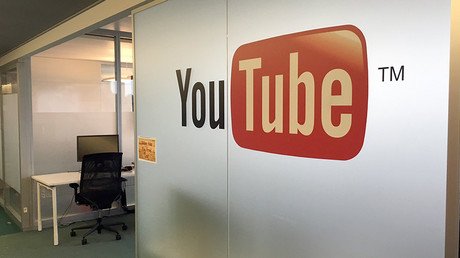Project Veritas Communications Director Stephen Gordon told RT about undercover videos allegedly revealing that YouTube algorithms are open to “intervention” and a NYT employee relied on the help of friends in Silicon Valley to promote his video content.
Gordon said that Project Veritas’ newly-released video of New York Times audience strategy editor Nick Dudich shouldn’t come as a surprise.
“It's not exactly that they're revelations, because I think it’s something we all know happens,” he said. “There's collusion between the social media networks and the major media outlets.
“We caught them admitting it. We caught them being candid on undercover video, admitting what most people, most Americans ...strongly suspect of the case anyway, but couldn’t prove. We’ve just proved it,” he said.
In the video released by Veritas, Dudich states that he parked a negative report about Facebook in a spot where he knew it would not draw a lot of traffic.
"Let's say something ends up on the YouTube front page, the ‘New York Times’ freaks out about it, but they don't know it's just because my friends curate the front page. So, it's like, a little bit of mystery you need in any type of job to make it look like what you do is harder than what it is," Dudich admitted in the recording.
Project Veritas also revealed that YouTube’s Earnest Pettie, the Brand and Diversity Curation Lead, admitted that YouTube algorithms can be controlled manually.
"Algorithms do control everything but sometimes you need humans to provide a check,” he said.
"Realistically, that's what the... that's what the news carousel kind of does. So like, it's above the search results so, at the very least, we can say this shelf of videos from news partners is legitimate news because we know that these are legitimate news organizations. And if at that point, somebody decides they're going to scroll past that and go find Alex Jones, well, they were looking for him to begin with anyway."

Gordon told RT there is a longstanding connection between the NYT and YouTube.
“When New York Times and YouTube are in bed, the bastard child of that relationship is fake news,” he said. “We've got more to come on the New York Times.”
Such kind of manipulation has always been in the media, Gordon says.
“Major internet companies are growing and maturing, becoming almost monopolistic. They’ve got the ability to do a lot more than they used to.”
According to Gordon, one of the worst deceits the mainstream media do is “gatekeeping.”
“They [media] are stopping or suppressing story lines they don’t want to hear or they don’t want you to hear. So they can bump up their narrative to the top of the list. And most people trust this. We need to break through that.”
The distrust in the media in the US is “very, very high,” Gordon said, adding that people “trust loggers and garbage men” more than the media.
Project Veritas is still going after fake news, Gordon said when asked about the project’s further steps of protecting the public.
“If I were an executive at NYT, I would be sleeping with one eye open, because who knows what we [will] have next week,” he said.
“We have more cameras, we have more people, we’ve got more videos coming soon.”
The New York Times responded to the undercover video with a statement on Tuesday.
“Based on what we’ve seen in the Project Veritas video, it appears that a recent hire in a junior position violated our ethical standards and misrepresented his role,” spokeswoman Danielle Rhoades Ha said, the New York Times reported.
“In his role at The Times, he was responsible for posting already published video on other platforms and was never involved in the creation or editing of Times videos. We are reviewing the situation now,” Rhoades Ha said.

